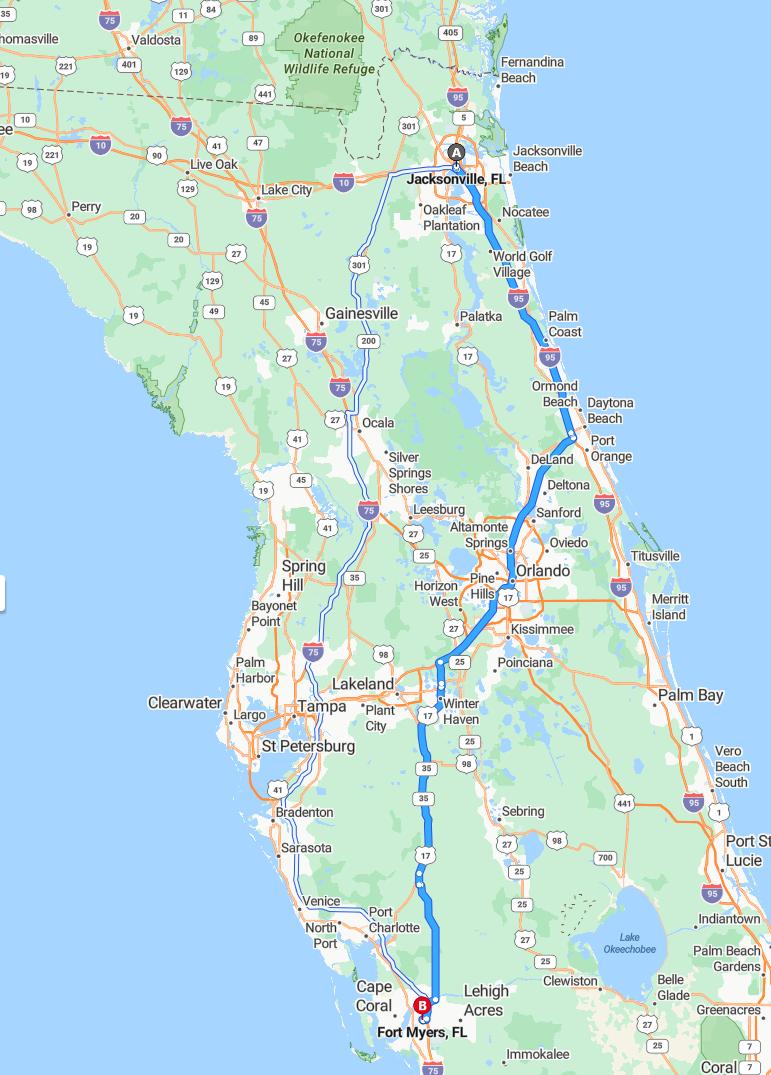Distance and estimated driving time
The drive from Jacksonville to Fort Myers covers approximately 293 miles and is estimated to take about 4 hours and 46 minutes. Travelers will primarily follow I-95 S and I-4 W, offering a relatively direct route between the two cities. This scenic journey traverses Florida's diverse landscapes, providing opportunities to enjoy various local sights along the way. Planning for potential traffic delays and ensuring your vehicle is prepared can help make this trip smooth and enjoyable.
Driving route
Traveling from Jacksonville to Fort Myers offers a scenic route through several vibrant cities and picturesque communities. Starting at Jacksonville Beach, the journey includes notable stops such as World Golf Village, Palm Coast, and Daytona Beach, known for their beautiful beaches and recreational opportunities. As you proceed south, cities like Orlando, Kissimmee, and Tampa provide cultural attractions and bustling urban environments. Further along, the route passes through St. Petersburg, Clearwater, and Sarasota, renowned for their arts, beaches, and historic sites. Concluding in Fort Myers, travelers can enjoy southern Floridian charm, waterfront activities, and a warm climate perfect for relaxation.

Best time to travel
The best time to travel from Jacksonville to Fort Myers is during the fall (September to November) and spring (March to May) when the weather is typically mild, and the region experiences fewer tourists. Traveling outside of peak summer months can help avoid heavy traffic congestion and ensure a more comfortable drive through popular destinations such as Orlando, Tampa, and Sarasota. Additionally, planning your trip during weekdays rather than weekends can reduce travel time, as highways tend to be less crowded. Overall, choosing periods with pleasant weather and lighter traffic will make your journey along the route more enjoyable and less stressful.
Road conditions and traffic updates
Traveling from Jacksonville to Fort Myers, drivers should stay informed about road conditions and current traffic updates, as routes pass through busy areas such as Orlando, Tampa, and Sarasota. Construction zones and maintenance activities are common, especially near major urban centers, potentially causing delays. Traffic congestion can be significant during peak travel times, particularly around Orlando and Tampa, so planning for extra travel time is advisable. Monitoring real-time traffic reports can help optimize your journey, ensuring a smoother and safer trip to Fort Myers.
Rest stops and amenities
Traveling from Jacksonville to Fort Myers offers numerous rest stops and amenities along the route, ensuring a comfortable journey. In cities like Daytona Beach, Orlando, and Tampa, travelers can find modern rest areas equipped with clean restrooms, picnic areas, and vending machines for snacks and beverages. Larger metropolitan areas such as Lakeland and St. Petersburg feature numerous gas stations, restaurants, and convenience stores for quick refueling and refreshment. Additionally, popular stop points like Palm Coast and Port Charlotte provide scenic outdoor spots and shopping centers, making it convenient to take breaks and enjoy amenities throughout the drive.
Points of interest along the route
Traveling from Jacksonville to Fort Myers, travelers can explore a variety of notable points of interest along the route. The journey includes visits to the scenic World Golf Village and the beautiful beaches of Daytona Beach and Clearwater, offering both recreational and sightseeing opportunities. In Orlando and Kissimmee, visitors can enjoy world-famous theme parks such as Walt Disney World and Universal Studios, providing entertainment for all ages. Additionally, charming coastal towns like St. Petersburg, Sarasota, and Venice showcase vibrant arts scenes, historic districts, and stunning waterfronts, adding cultural and leisurely experiences to the trip.
Fuel stations and costs
During the drive from Jacksonville to Fort Myers, fuel stations are conveniently available along the route, primarily at major cities and towns such as Orlando, Tampa, and Lakeland. Fuel prices vary by location, with averages generally ranging from $3.20 to $3.80 per gallon, depending on regional taxes and station brands. Notable stations include well-known chains like Shell, BP, and Chevron, which offer competitive prices and loyalty programs. Planning ahead by refueling at stations with the best prices can help optimize your fuel budget and ensure a smooth journey.
Weather forecast for travel days
Travelers heading from Jacksonville to Fort Myers should plan for variable weather conditions along the route. Expect possible afternoon thunderstorms and heavy showers, especially in central Florida, which could impact driving visibility and safety. In coastal areas like Tampa and St. Petersburg, there may be periods of sunshine mixed with intermittent rain showers. It is advisable to monitor local weather updates before and during the trip to ensure a safe and smooth journey.
Vehicle preparation tips
Before embarking on your long drive from Jacksonville to Fort Myers, it's essential to ensure your vehicle is properly prepared for the journey. Start by inspecting tire pressure and tread depth to guarantee safe handling and optimal fuel efficiency, especially as you'll pass through various city and highway segments. Check that all fluid levels--including oil, coolant, and windshield washer fluid--are topped off, and examine your brakes for responsiveness. Additionally, verify that your emergency kit is stocked with essentials such as a first-aid kit, flashlight, and roadside assistance tools to ensure you're ready for any unforeseen situations along the route.
Safety precautions and traffic laws
When driving from Jacksonville to Fort Myers, it is essential to prioritize safety by adhering to all traffic laws and regulations, including speed limits and seatbelt requirements. Stay alert for varying road conditions, especially in busy urban areas like Orlando, Tampa, and St. Petersburg, where traffic congestion can be frequent. Ensure your vehicle is well-maintained before the trip, with functional brakes and tires, to prevent breakdowns and accidents. Additionally, avoid distractions such as mobile devices, and follow safe driving practices to make your journey smooth and secure across the diverse en route destinations.
